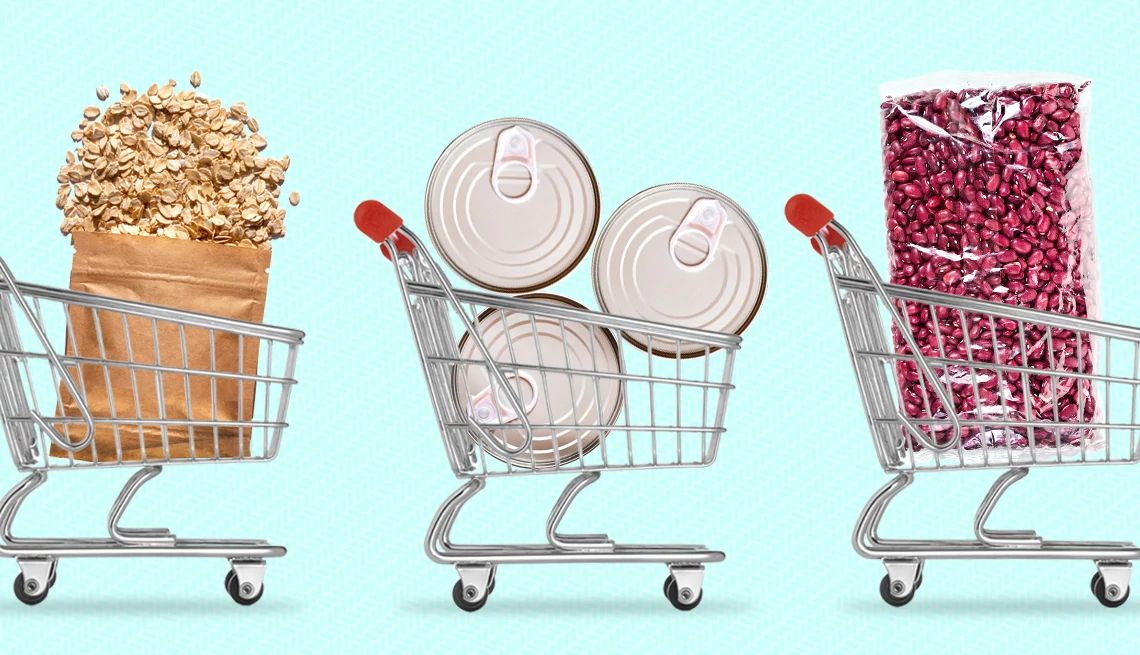Staying Fit


Jump to the products
Canned goods • Packaged foods • Beef and poultry • Some dairy products • Oatmeal, rice and dry pasta • Frozen foods • Dried legumes and other beans • Baking supplies
Supermarket sales are hard to come by these days, with food prices still elevated and shrinkflation still a thing. So when you see one should you pounce? The answer is maybe. Not all grocery store sales are created equal. Some will save you money while others can cost you more.
“Stocking up wherever you can is a really good strategy,” says Trae Bodge, a shopping expert at TrueTrae.com. “But be careful about buying things that are perishable.”


AARP Membership— $12 for your first year when you sign up for Automatic Renewal
Get instant access to members-only products and hundreds of discounts, a free second membership, and a subscription to AARP the Magazine.
When it comes to supermarket sales, consumers should focus on shelf-stable foods. These are foods that can last in the pantry for at least a year. They don’t have to be cooked or refrigerated to eat. Other foods that can be frozen for a few months can also be bargains. With that in mind, here’s a list of eight supermarket staples that you should buy on sale to help beat inflation.
1. Canned goods
Beans, soup, tuna fish, mushrooms and other canned staples are great to stock up on if they go on sale. These items are safe to consume years later, according to the U.S. Department of Agriculture, assuming the cans are in good shape, which means no rust, dents or swells.
2. Packaged foods
Cereal, pasta, cookies and other packaged foods also have long shelf lives and make a good option to stock up on when supermarkets offer discounts. They aren’t going to last for years, but they will remain safe beyond the “best by” date, according to the USDA. Keep in mind these grocery staples can become stale or develop an off flavor after a time, which will be evident when you open the package.
3. Beef and poultry
Buying beef and poultry on sale can be a great way to save money if you have the space in your freezer to store them properly. Ground beef is safe indefinitely if frozen, but the USDA says it’s best to use it within four months. Raw whole chickens can be frozen for up to one year, while parts can last for nine months and giblets or ground chicken can stay frozen for three to four months, according to the USDA. Bodge recommends buying them in bulk, breaking them down into smaller portions and putting a date on them. “It's always a good idea to date each item and eat them within a few weeks,” she says.
4. Some dairy products
If you consume a lot of cheese, milk and other dairy products, buying them on sale is a great way to save money. But if you want to stock up for the future, be careful which dairy products you purchase because their shelf life varies broadly. In the freezer, hard cheese can last six months, milk about three months and yogurt between one and two months, though the texture may be affected by thawing. Shredded cheese freezes the best, cheese experts say, while soft cheese and processed cheese slices don’t freeze well. In the refrigerator, hard cheese stores for six months before opening (and three to four weeks after it’s opened), processed cheese slices last one to two months, soft cheese about a week and yogurt one to two weeks, according to the USDA.



































































More From AARP
ABLE Accounts Help People With Disabilities Save
You can have up to $100,000 without losing government benefits
7 Ways Being a Cheapskate Can Hurt You
Cutting corners can sometimes lead to big bills
6 Money Habits to Break Now
Smarter ways to manage finances in 2023
Recommended for You